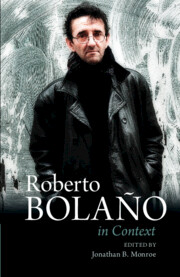Book contents
- Roberto Bolaño in Context
- Roberto Bolaño in Context
- Copyright page
- Contents
- Contributors
- Chronology
- Part I Geographical, Social, and Historical Contexts
- Chapter 1 Mapping Bolaño’s Worlds
- Chapter 2 Chile, 1953–1973
- 3 The Pinochet Era, 1973–1990
- Chapter 4 Dictatorships in the Southern Cone
- Chapter 5 Mexico City, 1968
- Chapter 6 Mexico City, Paris, and Life versus Art
- Chapter 7 Spain, Europe: 1977–2003
- Chapter 8 Transnational Currents: Europe and the Americas
- Part II Shaping Events and Literary History
- Part III Genres, Discourses, Media
- Part IV Aesthetics, Culture, and Politics
- Further Reading
- Index
Chapter 2 - Chile, 1953–1973
from Part I - Geographical, Social, and Historical Contexts
Published online by Cambridge University Press: 15 December 2022
- Roberto Bolaño in Context
- Roberto Bolaño in Context
- Copyright page
- Contents
- Contributors
- Chronology
- Part I Geographical, Social, and Historical Contexts
- Chapter 1 Mapping Bolaño’s Worlds
- Chapter 2 Chile, 1953–1973
- 3 The Pinochet Era, 1973–1990
- Chapter 4 Dictatorships in the Southern Cone
- Chapter 5 Mexico City, 1968
- Chapter 6 Mexico City, Paris, and Life versus Art
- Chapter 7 Spain, Europe: 1977–2003
- Chapter 8 Transnational Currents: Europe and the Americas
- Part II Shaping Events and Literary History
- Part III Genres, Discourses, Media
- Part IV Aesthetics, Culture, and Politics
- Further Reading
- Index
Summary
Roberto Bolaño is known as an iconoclast who spent his life in exile for opposing Chile’s 1973 Military Coup. He became a legend, especially after being awarded prestigious literary prizes in the late 1990s. As a teenager he decided to devote his life to literature, immersing himself in the Western canon, including Latin American literary traditions. His ambiguous relationship to Chile, his native country, and its narrative made him unwelcome among established writers. This essay examines the myths that circulate about his persona, as Bolaño composed not only his literary fiction but also his life, raising doubts with his accounts. It is not uncommon, therefore, to find erroneous information about his life and beliefs as these are transformed into literary accounts. Relying on academic criticism as well as letters, essays, and interviews with the author, relatives and friends, I seek a better understanding of Bolaño’s life experience. His family moved frequently within Chile, emigrated to Mexico in 1968, and in 1977 Bolaño left for Europe. I study his three trips to Chile (1973, 1998, 1999), particularly examining the first one when he would have been arrested and incarcerated for several days.
- Type
- Chapter
- Information
- Roberto Bolaño In Context , pp. 16 - 32Publisher: Cambridge University PressPrint publication year: 2023

